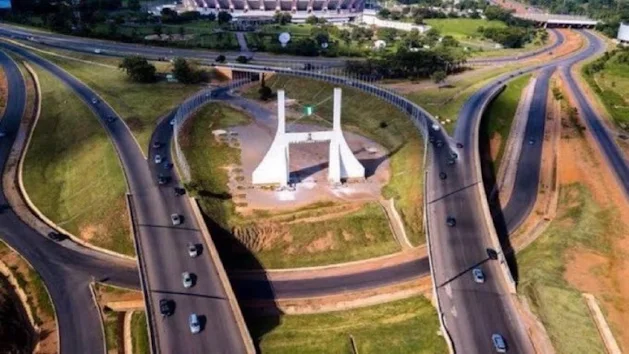In 1960, Nigeria was granted political independence as a sovereign state under the 1960 Constitution from Britain.
After independence Nigeria, like many newly independent African States, inherited a capital which was then Lagos, a state central in respect of international trade but distant from most constituent states in terms of administrative and cultural affairs.
Over time, the coastal town of Lagos, then Nigeria’s capital, grew rapidly leading to questions around the suitability of Lagos serving as both the Federal capital City of Nigeria and that of Lagos State.
Some of the problems with Lagos State being the capital were identified as; intolerable conditions of living and working, intractable traffic, chronic housing shortages, over congestion, overstretched infrastructure, and severe environmental sanitation problems.
Some include Lagos being the commercial nerve centre of the country, the possibility of relocating the aborigines of Lagos, the questions of scarcity of land for expansion and costs involved, potential security risks, skewed location, and challenges of possible submarine wreckage
These factors necessitated the setting up of a panel in August, 1975 by the then Military Regime of late Murtala Mohammed.
This committee was to advise if it was suitable for Lagos to retain its dual role of being both State and Federal Capital or if the capital was to move from Lagos.
If it was to be moved, the committee was charged with the responsibility to recommend suitable alternative locations, having regard to the need of easy access to and from every part of the country, among other factors.
The Panel, led by Justice Akinola Aguda, recommended that the Federal Capital Territory (FCT), should be moved out of Lagos.
The country needed a site with good climate, plenty of land and abundant water.
Different teams visited possible locations in the existing twelve Nigerian states, taking note of their capitals.
Afterward, Nigeria studied world capitals like Brasília (Brazil), Islamabad (Pakistan), Paris (France), St. Petersburg (Russia), and Washington, D.C. (United States). With Paris and Washington in mind, Abuja was chosen.
Over time, the coastal town of Lagos, then Nigeria’s capital, grew rapidly leading to questions around the suitability of Lagos serving as both the Federal capital City of Nigeria and that of Lagos State.
Some of the problems with Lagos State being the capital were identified as; intolerable conditions of living and working, intractable traffic, chronic housing shortages, over congestion, overstretched infrastructure, and severe environmental sanitation problems.
Some include Lagos being the commercial nerve centre of the country, the possibility of relocating the aborigines of Lagos, the questions of scarcity of land for expansion and costs involved, potential security risks, skewed location, and challenges of possible submarine wreckage
These factors necessitated the setting up of a panel in August, 1975 by the then Military Regime of late Murtala Mohammed.
This committee was to advise if it was suitable for Lagos to retain its dual role of being both State and Federal Capital or if the capital was to move from Lagos.
If it was to be moved, the committee was charged with the responsibility to recommend suitable alternative locations, having regard to the need of easy access to and from every part of the country, among other factors.
The Panel, led by Justice Akinola Aguda, recommended that the Federal Capital Territory (FCT), should be moved out of Lagos.
The country needed a site with good climate, plenty of land and abundant water.
Different teams visited possible locations in the existing twelve Nigerian states, taking note of their capitals.
Afterward, Nigeria studied world capitals like Brasília (Brazil), Islamabad (Pakistan), Paris (France), St. Petersburg (Russia), and Washington, D.C. (United States). With Paris and Washington in mind, Abuja was chosen.
By Nigeria stories on X


Good one
ReplyDeleteNice one
ReplyDeleteNo be today Lagos State people dey suffer intolerable conditions of living and working, intractable traffic, chronic housing shortages, over congestion, and severe environmental sanitation problems.
If not for insecurity, Abuja and indeed, some other northern cities are great places to live in
ReplyDeleteImagine if it was still Lagos???
ReplyDeleteAbuja is just perfect as FCT, good roads, surplus land, so organized. Plus it is close to KD
Hmmm
ReplyDeleteI thought Tinubu founded Lagos? So the story was false all along.
ReplyDelete🤣🤣🤣🤣🤣
DeleteYes it is true, Tinubu founded Lagos in 1935 before the colonisers came, he then moved to his state - Ogun, then he returned back to Lagos in 1963 to continue, he applied to be Governor but he did not win so that was how he travelled to Chicago and was there till 1993 before he finally returned back to Lagos to continue building from where he stopped.
DeleteHe founded mainland in 1935, Island in 1963, Ajah in 1993, Epe in 2003 and Eleko in 2013.
Any questions?
Good.
ReplyDeleteInteresting! Thanks SDK 🙌🙌
ReplyDeleteObianuju Augustina
hmmm ....
ReplyDeleteI so love history ehn. Keep it coming
ReplyDelete...and after promising Abuja natives of compensation, many natives are being thrown /evicted without adequate compensation for their lands.
ReplyDelete